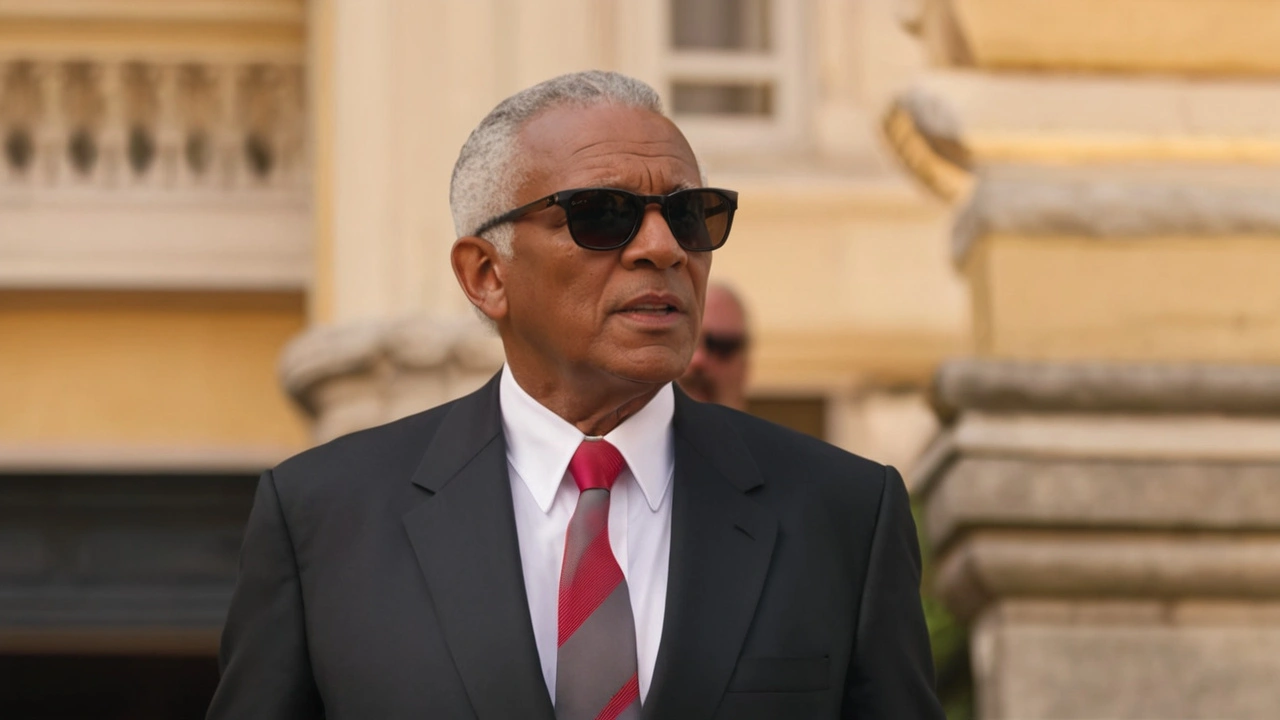Aliko Dangote Cancels Steel Plant Plans in Response to Monopoly Allegations
Aliko Dangote, widely recognized as Africa's richest man, has decided to abandon his ambitious plans to invest in a new steel plant in Nigeria. The move comes amid escalating accusations from the Nigerian government suggesting that Dangote's colossal business empire is threatening to veer into monopolistic territory. The situation arose as authorities scrutinize Dangote's newly operational refinery, suspecting efforts to dominate key sectors.
Accusations of Market Domination
The Nigerian government raised the alarm over what it perceives as monopolistic maneuvers by Dangote's enterprises. According to officials, Dangote made significant waves by allegedly requesting the suspension of diesel and aviation fuel imports. This request, authorities argue, would effectively bestow a monopoly upon his refinery concerning these critical commodities. In response, Dangote has firmly denied these allegations, asserting that his aim has never been to monopolize the market but rather to enhance Nigeria's self-sufficiency. Such claims did little to alleviate the concerns of watchdogs and policy-makers emphasizing the potential for market disruption.
Diverse Production Journey
Dangote's refinery, which kicked off operations in January, has already made strides in various petroleum product sectors. The plant contributes notably to the country's energy landscape by producing aviation fuel, naphtha, and diesel. The refinery is set to reach new heights with the upcoming commencement of gasoline production slated for August. This development is expected to boost the refinery's output to an impressive 550,000 barrels daily by year's end. Despite these advancements, the shadow of monopoly allegations continues to loom over every business decision.
Economic Context and Responses
This development cannot be seen in isolation but must be viewed against the broader backdrop of Nigeria's economic landscape. As Africa's most populous nation and a significant player in the global oil market, Nigeria's strategies for energy independence are closely watched. Dangote's refinery was initially heralded as a landmark project promising to reduce the nation's reliance on imported fuels. However, the shift in narrative towards fears of market overreach has cast a pall over what was seen as a beacon of industrial progress.
It is important to note that Dangote is not new to controversy. Over the years, his business ventures have often faced accusations ranging from unfair competitive practices to governmental favoritism. Nevertheless, his contributions to Nigeria's economy and employment landscape are undeniable, with many regarding him as a pivotal figure in the nation's industrialization drive.
Corporate Denials and Market Impact
In his defense, Dangote has maintained a consistent stance that his refinery operations are geared towards enhancing Nigeria's industrial capabilities rather than constricting the market. Asserting that competition drives innovation and quality, he dismissed the government's claims as unfounded. This tug-of-war between Dangote and Nigerian regulatory authorities has inevitably led to an atmosphere of uncertainty among investors and industry insiders.
The potential repercussions of Dangote’s halted steel investment are far-reaching. The absence of a new steel plant represents a missed opportunity for job creation and technological advancement in Nigeria. Moreover, it underscores the delicate balance required in navigating large-scale industrial undertakings within complex regulatory environments.
Looking Ahead
As Dangote's situation demonstrates, the road to economic transformation is fraught with challenges. The interplay between corporate ambitions and regulatory frameworks remains a critical aspect of Nigeria's industrial policy. Stakeholders will be keenly observing how this narrative unfolds, particularly as it pertains to future investments and industrial projects. In the meantime, Aliko Dangote's focus will likely remain on ensuring that his existing ventures, particularly the refinery, continue to operate within legal and market parameters.
Although Dangote's decision to scrap his steel investment project is a significant setback, it also serves as a stark reminder of the ongoing tensions between economic development and regulatory oversight in emerging markets. As Africa's economic giant grapples with these complex issues, the need for transparent and balanced policies has never been more apparent. For now, the scrutiny on Dangote — both as a business mogul and a symbol of Nigeria's industrial aspirations — will persist, potentially shaping the course of future industrial endeavors.






Dennis Lohmann
July 22, 2024 AT 19:34Hey everyone, just wanted to point out that Dangote’s move, while disappointing, could open doors for other local players to step up 🚀. It’s a reminder that markets thrive on competition, not monopoly. Diversification is key for sustainable growth, and we’ll likely see new opportunities emerge. Let’s keep an eye on how the regulatory landscape evolves, and maybe support upcoming ventures that fill the gap. Stay optimistic and collaborative! 😊
Jensen Santillan
July 29, 2024 AT 18:14Frankly, this episode underscores the perennial hubris of African oligarchs who mistake capital accumulation for nation‑building. Dangôte’s self‑censorship is a tactical retreat, not a concession to market fairness. The state’s alarm over monopoly is merely a veneer for political leverage, yet the narrative persists because elites crave drama. One must ask whether the refinery’s expansion truly serves the public or merely reinforces a corporatist enclave. In any case, the discourse remains riddled with sophistry and selective outrage.
Mike Laidman
August 5, 2024 AT 16:54The steel project cancellation is a setback it may affect jobs and industrial capacity
J T
August 12, 2024 AT 15:34Wow, talk about a plot twist 😅
A Lina
August 19, 2024 AT 14:14From a strategic assessment perspective, Dangote's withdrawal epitomizes a classic case of market entry deterrence via regulatory capture. The externalities associated with a single-player steel monopoly jeopardize supply chain resilience and amplify systemic risk. Moreover, the asymmetry of information between the conglomerate and policy‑makers can precipitate adverse selection in resource allocation. Consequently, the decision, while ostensibly reactive, aligns with broader economic governance imperatives. Synthesizing these variables, the outcome is arguably beneficial for competitive equilibrium.
Virginia Balseiro
August 26, 2024 AT 12:54What a roller‑coaster! 🌟 The ambition was sky‑high, the fallout is heart‑wrenching, and now we’re left clutching the afterglow of what‑could‑have‑been. It’s a stark reminder that even titans can stumble when the system pushes back. Still, I’m hopeful – perhaps this will spark a wave of fresh entrepreneurs daring to fill the void. Let’s keep the fire alive and cheer on the next generation of innovators! 🎉
Jared Mulconry
September 2, 2024 AT 11:34It’s worth considering that the regulatory concerns may stem from a genuine desire for market diversity. While Dangote’s influence is undeniable, smaller firms could thrive given a level playing field. I’m inclined to view this as an opportunity rather than a loss, provided policy frameworks support inclusive growth.
Brandon Rosso
September 9, 2024 AT 10:14Esteemed members of the community, I wish to extend my profound encouragement in light of these developments. Though the steel venture has ceased, the underlying spirit of industrial advancement endures. Let us collectively champion alternative initiatives that embody resilience and ingenuity. May our discourse remain constructive, fostering a climate where future enterprises can flourish. I remain optimistic about the manifold possibilities ahead.
Tracee Dunblazier
September 16, 2024 AT 08:54Appreciate the balanced perspective offered earlier; indeed, collaboration can mitigate such setbacks. It’s crucial we nurture emerging players to sustain the industrial momentum. Unity in our approach will pave the way for a more robust ecosystem.
Edward Garza
September 23, 2024 AT 07:34The analytical lens reveals that Dangote’s retreat may simply be a strategic hedge against regulatory risk. While the tone of criticism is loud, the data suggests a calculated pullback rather than a capitulation. Observers should thus recalibrate their expectations accordingly.
Allen Rodi
September 30, 2024 AT 06:14For those tracking the ripple effects, note that ancillary suppliers could experience a short‑term dip. However, this vacuum often catalyzes diversification among local manufacturers. Keeping an eye on procurement trends will be informative.
Jody Webster
October 7, 2024 AT 04:54Um... I mean... This whole thing? It’s like, wow!!! Did anyone see that coming?? Definitely not! :D
Steve Goodger
October 14, 2024 AT 03:34When I reflect on the broader economic tapestry of Nigeria, it becomes evident that the cancellation of a single steel project does not erase the intricate weave of ambition, policy, and societal expectation that constitutes the nation’s industrial narrative. First, the sheer magnitude of Dangote’s prior achievements in refining and petrochemicals has set a bar that other domestic actors now feel compelled to reach, fostering a competitive spirit that, while healthy, also breeds anxiety among incumbents. Second, the government’s vigilance in guarding against monopolistic concentration, though occasionally perceived as heavy‑handed, is rooted in a legitimate concern for market fluidity and consumer welfare. Third, the interplay between private capital and public oversight can be likened to a delicate dance, where missteps on either side reverberate through employment statistics, foreign investment inflows, and even regional trade balances. Fourth, the void left by the steel plant’s abandonment may inspire a new generation of entrepreneurs to explore alternative materials, such as advanced composites or recycled metals, thereby diversifying the industrial base. Fifth, the underlying message to the global community is one of cautious optimism; investors will watch how Nigeria navigates this juncture to gauge the reliability of its regulatory framework. Sixth, the narrative also underscores the importance of transparent communication; when large conglomerates articulate their strategic pivots with clarity, it lessens market speculation. Seventh, there is an educational component for policymakers, who can study this episode to refine antitrust guidelines that are both firm and fair. Eighth, the labor force, while facing short‑term uncertainty, ultimately benefits from a marketplace that encourages skill development across multiple sectors. Ninth, environmental considerations should not be overlooked, as steel production carries significant carbon footprints; a pause offers an opportunity to integrate greener technologies in future projects. Tenth, the cultural dimension-public perception of conglomerates as both benefactors and potential overlords-continues to evolve, shaping social contracts. Eleventh, regional competitors may interpret this development as a signal to accelerate their own industrial agendas, thereby intensifying intra‑African competition. Twelfth, academia can leverage this case study to enrich curricula on development economics and industrial policy. Thirteenth, civil society organizations might use this moment to advocate for stronger community engagement in large‑scale projects. Fourteenth, the financial sector must assess credit risk profiles for similar large‑scale endeavors in light of regulatory scrutiny. Fifteenth, ultimately, the saga serves as a reminder that economic progress is not a linear ascent but a series of negotiated compromises, each carrying the potential for both setbacks and breakthroughs.
johnson ndiritu
October 21, 2024 AT 02:14Honestly, this is a textbook example of elite hubris meeting the cold reality of public policy 🙄. One cannot excuse the moral bankruptcy of a billionaire who thinks he can steer an entire sector at will. The fact that he backs down only after the state intervenes proves that no amount of wealth can buy absolute power. 🌐🚨 Let’s hope this serves as a cautionary tale for future moguls.
sheri macbeth
October 27, 2024 AT 23:54Oh sure, because the government is totally not trying to control the narrative, right? 🙃 I’m just thrilled to see the ‘giant’ finally taking a coffee break from world domination. Nice move, Dangote! 😏
Sameer Kumar
November 3, 2024 AT 22:34When we ponder the philosophical underpinnings of industrial ambition, we encounter a dialectic between collective progress and individual aggrandizement. The steel venture’s cessation invites contemplation on the balance of power in emerging economies. A nuanced view recognizes both the potential for societal uplift and the risk of concentration. In this light, policy becomes the mediator that harmonizes divergent aspirations. Let us therefore champion dialogues that honor both economic vigor and equitable stewardship.
Lane Herron
November 10, 2024 AT 21:14Yet another chapter in the saga of corporate theatrics-Dangote’s retreat is merely the latest act in a long‑running drama of market manipulation. The jargon‑laden justifications mask a fundamental truth: power consolidates unless checked, and the state’s alarm is a backstage whisper of impending monopoly. Such performances, while riveting, erode the very foundations of fair competition.
Lois Parker
November 17, 2024 AT 19:54People make big mistakes when they think they own everything.
Lerato Mamaila
November 24, 2024 AT 18:34Indeed, the whole situation-perhaps, is-quite; a remarkable; example of market dynamics!; It underscores, the need; for balanced policies!; Absolutely; marvelous!;